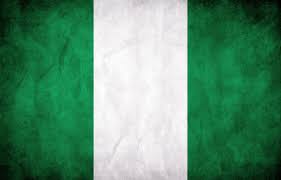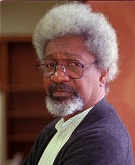
NIGERIA:
Nigeria,
officially the Federal Republic of Nigeria (English Federal Republic of
Nigeria, in Hausa Jamhuriyar Taraiyar Nijeriya, in Igbo Ȯha nke Ohaneze
Naíjíríà, in Yoruba Àpapọ Olómìnira ilẹ Nàìjíríà) is a sovereign country
located in West Africa, in the Gulf of Mexico Guinea, whose form of government
is the presidential federal republic. Its territory is composed of 36 federal
states and a federal district.
Its total
population is 181,562,056 inhabitants (2015). The capital is Abuja, with
1,178,568 inhabitants, and its most populated city and former capital is Lagos,
with 7,937,932 inhabitants (2006 data).
The
appearance of human presence in the area of Nigeria is dated around 9,000 a.
C., although it was probably inhabited previously.3 The area around the Benue
River and the Cross River is the place of origin of the Bantu that spread in
waves throughout Central and Southern Africa from the 5th century BC. C.
Nigeria is
the most populous country in Africa and the seventh in the world (surpassing
Japan and Russia). It is also grouped into the Next Eleven (also known as N-11)
which is a group of countries with great prospects for investment and growth in
the future. Nigeria's economy is the largest in Africa4 and one of the fastest
growing in the world, with growth estimates of 9% in 2008 and 8.3% in 2009.5 6
7 The IMF expects Nigeria to grow 8% in 2011
HISTORY:
The
Kanem-Bornu empire near Lake Oiiee dominated northern Nigeria from the 13th
century for almost 600 years, thriving thanks to north-south trade with the
northern Berbers. In the early years of the nineteenth century, most of the
northern areas were under the control of an Islamic empire based in Sokoto.
The kingdom
of Oyo in the southwest and the kingdom of Benin in the southeast developed
elaborate systems of political organization in the fifteenth, sixteenth and
seventeenth centuries. Ife and Benin are known for their prized artistic works
in ivory, wood, bronze and brass.
In the
seventeenth and nineteenth centuries, European merchants established coastal
ports for the slave trade destined for the American continent. Merchandise
trade replaced the slave trade in the 19th century.
The Royal
Niger Company was established by the British government in 1886. Nigeria became
a British protectorate in 1901, and a colony in 1914. In response to the growth
of Nigerian nationalism after World War II, the British replaced the colony
with a kind of autonomy on a federal basis.
The name
Nigeria first appeared in print in the newspaper The Times in 1897.9 It gave it
the name Flora Shaw, the future wife of Baron Lugard, a nineteenth-century
British administrator.
Nigeria was
granted full independence in 1960, as a federation of three regions, each
retaining a substantial degree of autonomy.
In 1966,
two successive coups by different groups of army officers led the country to
military rule. The leaders of the second coup tried to increase the power of
the federal government and replaced the regional governments by 12 state
governments. The Igbos, the dominant ethnic group in the eastern region,
declared independence as the Republic of Biafra in 1967, followed by
persecutions in the northern states that led to the extermination of 30,000
Igbo. After the declaration of independence of Biafra, the war broke out with
the Federal Government. Under Brigadiers Adekunle, Obasanjo and Murtala
Mohammed, a plan of systematic and amphibious attack that included heavy aerial
bombings and famine, forced the Biafran rebels to capitulate. On January 15,
faced with the option to surrender and the total destruction of the Biafran
population, Philip Effiong, Chief of Staff of the rebel army accepted the
conditions of surrender before Yakubu Gowon, Chief of the North dominated by
the federal government.

In 1975 a
bloody coup d'etat overthrew Gowon and brought Murtala Ramat Mohammed to power,
which promised the return of civil government. However, he was killed in an
aborted coup, and was succeeded by his chief of staff, Olusegun Obasanjo. A new
constitution was drafted in 1977, and elections were held in 1979, which were
won by Shehu Shagari.
Nigeria
returned to the military government in 1983, through a coup that established
the Supreme Military Council as the new governing body of the country. Chief
M.K.O. Abiola won the presidential election of June 1993, which was canceled by
the military government of General Ibrahim Babangida. An interim national
government was established, headed by Chief Ernest Shonekan. The Government was
declared illegal and unconstitutional by a High Court, and General Sani Abacha
assumed power. He imprisoned the Chief M.K.O. Abiola and looted the National
Treasury. Many people were killed during the regime of Babangida and Abacha;
Among the most notable is Ken Saro-Wiwa. Ken Saro-Wiwa was an internationally
known and respected journalist whose murder shook many inside and outside the
world of journalism. His family went to trial and brought charges against the
Nigerian government through the New York court system.
The Abacha
terror regime came to an end when he died suddenly and in 1998 Abdulsalami
Abubakar became leader of the Provisional Governing Council. He lifted the
suspension of the 1979 constitution to free Chief M.K.O. Abiola, the winner of
the 1993 election before the latter died in July 1998, a fact that medical
experts initially attributed to natural causes; Later, this death was
considered as death by poisonous substance. The cases of the Court since the
death of Abiola have brought to light that he was poisoned. [Citation needed]
In 1999,
Nigeria elected Olusegun Obasanjo as president in his first elections in 16
years. Obasanjo and his party also won the turbulent elections of 2003. The
success of the democratic dream in Nigeria presents serious doubts after the
murder of the Minister of Justice, Bola Ige, a lawyer for peace, justice and
political openness; and in particular by the legislative and presidential
elections of 2007 that presented irregularities and by a series of
confrontations that caused several deaths.





